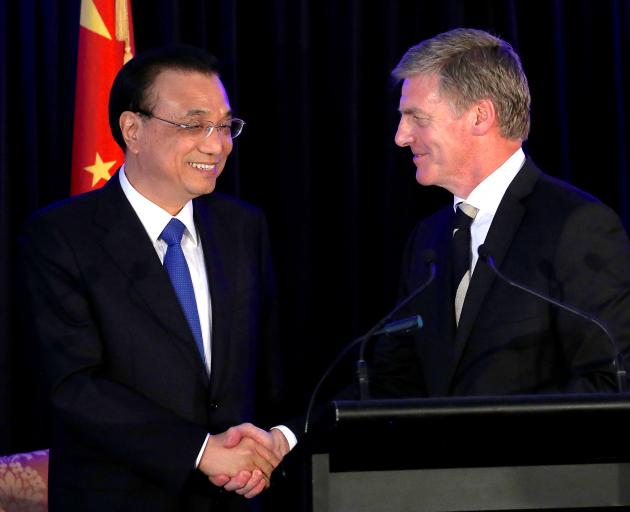
Negotiations for an ``upgrade'' to the New Zealand-China free trade agreement will begin next month - a step Prime Minister Bill English said would help boost trade to $30 billion.
The April 25 start date for talks was announced after a bilateral meeting between China's Premier Li Keqiang and Prime Minister Bill English on Li's visit to Wellington.
Mr English said New Zealand was hoping for better access for some exporters under a renegotiated deal. New Zealand has been pushing for an upgrade since Australia signed its free trade agreement in 2015 on better terms than New Zealand's 2008 model.
After the meeting, Premier Li also strongly rejected any claims China was ``dumping'' steel in the New Zealand market.
The Ministry of Business, Innovation and Employment is investigating claims of dumping - an investigation that has caused problems between New Zealand and China in the past.
Mr Li said that 90% of Chinese steel was used domestically.
He acknowledged there was a global oversupply of steel and said China last year began scaling back production. He said exports of zinc-coated steel to New Zealand made up just 5% of all steel New Zealand imported.
``Most of New Zealand's steel imports come from other countries - not China. So China is not dumping steel products in New Zealand.''
He pointed to the amount of dairy New Zealand exported to China, saying 50% of China's dairy imports were from New Zealand. ``But we haven't said New Zealand is dumping dairy products in China.''
Mr Li's denial followed a more confused answer which appeared to acknowledge the possibility of dumping but was put down to confusion with the translation of the question.
Mr Li had initially said China did not accept other countries' ``waste'' so would not send waste to other countries - and China would investigate if there were any such ``immoral'' practices taking place.
He later raised the issue again to deny dumping, saying he had not understood the question properly at first.
Speaking to media later, Mr English said it was a sensitive issue for China and the investigation was being done at an `arm's length' from the Government.
He was not surprised when Mr Li had countered it by raising New Zealand's dairy exports to China, saying that demonstrated the ``robustness'' of the relationship. ``These are issues that get talked about in pretty testing ways, and that's as it should be.''
Mr English said the FTA upgrade would help achieve the Government's target of $30 billion in two-way trade by 2020 - up from $23 billion now. ``The upgrade will allow us to modernise the FTA to take account of changes in our economic relationship since the FTA came into force.''
Premier Li, speaking through a translator, pointed to the importance of bolstering free trade at a time of a backlash against globalisation and free trade.
``This will give a strong boost to trade links between China and New Zealand and will send a positive signal to the world and to the region that our two countries are committed to free trade.''
However, Mr English was less effusive about New Zealand signing the China-led Regional Comprehensive Economic Partnership agreement, saying there were questions about whether it would be as high quality as New Zealand wanted. ``With RCEP that's a bit of a challenge.''
Mr English said although the pair had discussed China's role in international security and matters such as the South China Seas, which Mr English said should be dealt with according to international rules.
``We know it's a sensitive issue between New Zealand and China and we don't think it will have an impact on the rest of the relationship, but New Zealand's expectation has not changed.''
The pair also discussed North Korea, and Mr Li had emphasised China's interest in stability.
``The Premier simply expressed the desire of the Chinese to maintain the kind of stability that has fed the economic growth that has benefited everybody. You got a pretty clear picture from the Premier that the Chinese leadership is focused on the right conditions for ongoing economic growth.''
Mr English said there was discussion about the US-China relationship since the election of US President Donald Trump, saying Mr Li had been positive about it and pointed to the economic interdependence between the two.
``We expressed New Zealand's interest in that being a functional, positive relationship because if it isn't it has a significant economic and political impact.''
He said Mr Li was an economic expert and knew what was at stake.
Mr English and Mr Li announced a raft of agreements between New Zealand and Australia, ranging from the free trade agreement upgrade to an agreement for China to export pre-peeled onions to New Zealand. English said it underlined the breadth and depth of the relationship.
A further ``first'' was added to the tally - New Zealand became the first to sign China's ``Belt and Road'' initiative - a programme of transport infrastructure and technology ``corridors'' across the world which could result in joint infrastructure projects.
Other measures announced include:
- A streamlined process for ``trusted exporters'' to get faster border clearance of goods
- An increase in direct flights between China and New Zealand from 49 - 59 a week
- A six month trial of exports of chilled meat from 10 meat processors in New Zealand to China
- Further co-operation in agriculture, fisheries, South Pacific, environmental research and health and intellectual property.
- A commitment to work together on climate change plans
- A ``Year of Tourism'' package to boost tourism from China - China is the second biggest visitor market after Australia, spending $1.7 billion a year.












